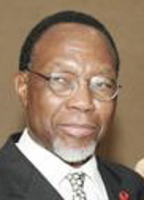 South African President Jacob Zuma is looking for ways to cut his country’s trade deficit with its largest partner as he begins a three day visit to China. Last year South Africa ran a $2.7 billion trade deficit with China and Zuma’s Trade Minister explained why in a press conference on arrival in Beijing today. “In South Africa's export market to China there is a preponderance of primary products, and in our imports from China there is a preponderance of value-added goods," he said. Davies and his boss Zuma want Chinese manufacturers of power equipment, railway cars, solar water heaters and vehicles to consider setting up factories in South Africa.
South African President Jacob Zuma is looking for ways to cut his country’s trade deficit with its largest partner as he begins a three day visit to China. Last year South Africa ran a $2.7 billion trade deficit with China and Zuma’s Trade Minister explained why in a press conference on arrival in Beijing today. “In South Africa's export market to China there is a preponderance of primary products, and in our imports from China there is a preponderance of value-added goods," he said. Davies and his boss Zuma want Chinese manufacturers of power equipment, railway cars, solar water heaters and vehicles to consider setting up factories in South Africa. The relationship between the two countries is growing in importance as China continues its push for influence across the continent of Africa. In the first six months of 2010, there was $10.8 billion trade between the two countries almost half as much again as the same period last year. Zuma will hold talks with Chinese President Hu Jintao in Beijing and will also meet Premier Wen Jiabao and tour the World Expo site in Shanghai. Zuma will be accompanied by an enormous delegation of 300 ministers and businesspeople as the Africans aim to emulate the Chinese growth rate.
Zuma expects to sign a number of agreements and memorandums of understanding during the visit. These include a declaration on the establishment of a comprehensive strategic partnership, and MOUs on co-operation in the fields of geology and mineral resources, environment management, transport and railways. There will also be a business seminar in Beijing with over 200 South African business leaders and entrepreneurs to further enhance and strengthen economic co-operation. The visit will conclude on Thursday when Zuma views the South African Pavilion at the Shanghai 2010 World Expo.
The relationship between the two countries is one of the fastest growing in the world. The countries did not re-establish relations after the end of apartheid until 1998 but within 11 years China had overtaken the US to become SA’s largest exporter and importer of goods and services. Zuma has called the trip “crucial” with China National Nuclear Corp in talks to build a nuclear power plant in South Africa. The relationship is important to China too which imports SA iron ore, iron and steel to fuel its growing economy. Chinese Vice Commerce Minister Gao Hucheng said his government would encourage domestic companies to invest in South Africa's mining and resources sector.
According to Chinese State news agency Xinhua, Zuma and Jintao signed a Beijing Declaration in the Great Hall of the People earlier today. The declaration contained 38 bilateral cooperation agreements, including political dialogues, trade, investment, mineral exploration and agriculture to joint efforts in the UN and the Forum on China-Africa Cooperation. The declaration also promised to strengthen cooperation between the two nations in political and regional affairs by “establishing a comprehensive strategic partnership based on equality, mutual benefit and common development”.
Zuma’s China trip is a welcome relief as he faces mounting problems at home, with more than a million public sector workers striking. The success of the World Cup is a distant glow as a strike by more than a million public sector workers enters its second week. Strikers include teachers, healthcare workers, police, customs officials and clerks who are seeking pay raises of more than double the inflation rate. The strike is paralysing the economy and police have used rubber bullets to disperse angry protesters on the streets. Unions are pressing for a settlement but Zuma said he will not negotiate until he returns from China.
As the Wall Street Journal notes, the health of South Africa’s economy is direct tied to China whose demand for SA resources is keeping the rand high. The currency’s strength continues despite the strikes and persistently high unemployment and public-sector strikes. The public sector unions were crucial in getting Zuma the top job so it is likely he will meet their demands. This will push South Africa's already high inflation rate to well over 5 percent by year’s end, and lead to another cycle of pay demands next year. The 68-year-old president will need all the help he can get from his new Chinese alliances.



